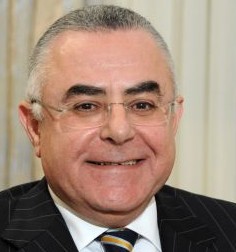Tarek Amer, Governor of the Central Bank of Egypt (CBE), said that the CBE is ready to repay any foreign obligations on Egypt at any time without delay.
In response to Daily News Egypt’s question on whether or not Egypt can afford repaying its debts and interests, estimated at $13bn during 2017/2018, Amer answered with yes, “we are ready for that without any doubt.”
The debts due to be repaid during the next year include deposits obtained by Egypt from Saudi Arabia worth $2bn in 2013, $2bn from the United Arab Emirates (UAE), and $2bn from Kuwait, in addition to $2bn obtained from Libya in 2013.
The CBE will repay $5.22bn during this year, $6bn in 2019, $6.1bn in 2020, and $3bn in 2021.
Amer said that the CBE is keen to repay foreign obligations on time, and that it depends on large flows and strong reserves of foreign exchange.
He revealed that there are ongoing negotiations with international financing institutions on financing projects inside Egypt. He has not specified a deadline for receiving the second tranche of the International Monetary Fund’s (IMF) loan, worth $1.25bn.
Egypt received the first tranche of $2.75bn on 12 November 2016.
In response to a question about the deadline for the sale of the United Bank and offering the shares of Banque du Caire and the Arab African International Bank (AAIB) in the stock exchange, Amer said that this is part of the government’s plan for the offerings—and, therefore, the timing is in the hands of the government.
Amer took part in the third economic conference of El Amwal newspaper in his first appearance after returning from medical treatment in Germany.
Amer responded to rumours about his ability to continue his tenure, saying that he is fine. “My leg is good, and my brain is working.”
Rumours circulated when Amer was abroad that he will not be able to continue as the CBE’s Governor to end his four-year tenure that began in November 2015. Several names of possible successors were circulated, including Hisham Ezz Al-Arab, chairperson of the Commercial International Bank.
He also refuted rumours about submitting his resignation. “Why would I resign?” he asked. Amer stressed that the CBE prioritises operations next to curbing inflation.
He said that Egypt entered free trade agreements without being prepared for them, which increased imports from $18bn in 2003 to $76bn in 2016, including $12bn worth of goods from China alone every year.
He pointed out that 88% of growth recorded over the past few years was consumption, not real economic activity, adding that facing the problems was necessary and it must be supported by the people, the political leadership, and the world.
He noted that CBE secured $30bn in the past five years, including $13bn from the local market and the remainder from foreign institutions.
He explained that there is nothing standing in the way of foreign investments now.
“I took office when there were goods stuck at ports worth $5bn, now there is not a single dollar worth of goods stuck,” Amer stressed.
According to Amer, the volume of Arab deposits received by the CBE fell to $2bn in 2016, down from $31bn between 2011 and 2015.
He pointed out that the size of loans granted to small and medium enterprises (SMEs) amount to EGP 101bn.
He stressed that banks spare no efforts to support SMEs, adding that the CBE prepared several public and private banks as well as institutions to support the sector.
Amer emphasised the CBE’s satisfaction with the foreign exchange reserves at the end of February 2017, recording $26.5bn, noting that there is no need to increase it further now, even though it is expected to rise in the coming period.
Deputy CBE governor Gamal Negm said, during the conference, that banks covered imports of $24bn since flotation until now, including $8bn of letters of credit.
He added that financial stability requires diversity in economic activities and credit portfolio, highlighting the role of small businesses in achieving financial inclusion.




